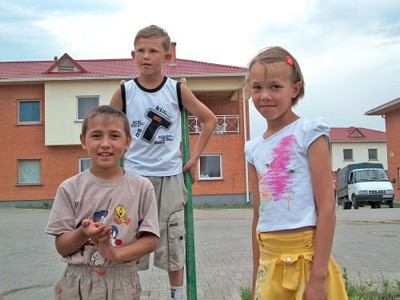Child Sponsorship Background from Temirtau, near Karaganda, Kazakhstan
 SOS Children's Village Temirtau, near Karaganda
SOS Children's Village Temirtau, near Karaganda
Temirtau is situated about 180 kilometres southeast of Astana, the country's capital. The nearest larger city is Karaganda, capital of the Karaganda region and third most populous city in Kazakhstan after Almaty and Astana.
Due to the high unemployment rate in Temirtau there are a large number of orphans and vulnerable children. The seven hectares plot of land was given to SOS Children's Villages as a donation by the local municipality.
The official opening ceremony of the SOS Children's Village took place on 5 September 2005.
The SOS Children's Village Temirtau comprises twelve family houses, houses for the village director and the SOS aunts (who support the SOS mothers and take care of the children when the mothers are on leave), a multipurpose hall and an administration and service area. Up to 108 children can be accommodated in the twelve family houses and will find a new home there.
Other SOS Projects in Temirtau
The family strengthening programme offers access to essential services for children’s development (eg. educational, nutritional and health support, social skills) and supports families to protect and care for their children. The programme also aims at linking families with income generating activities and offers help to improve the parents’ parenting skills.
The SOS playbus is a mobile centre for children offering imaginative play material and educational games, stopping off at public parks and hospitals, at orphanages and grey concrete tower blocks. Activities such as playing theatre, dancing and various craft activities aim at helping children to achieve confidence in themselves and in others.
Background to Karaganda
Karaganda is the capital of Karagandy Province in Kazakhstan. It is the fourth most populous city in Kazakhstan, behind Almaty, Astana and Shymkent, with a population of nearly half a million. This has historically been made up of ethnic Germans, descendants of Soviet Volga Germans. In the 1940s up to 70% of the city's inhabitants were ethnic Germans.

 Return to Schools Wikipedia Home page…
Return to Schools Wikipedia Home page…
